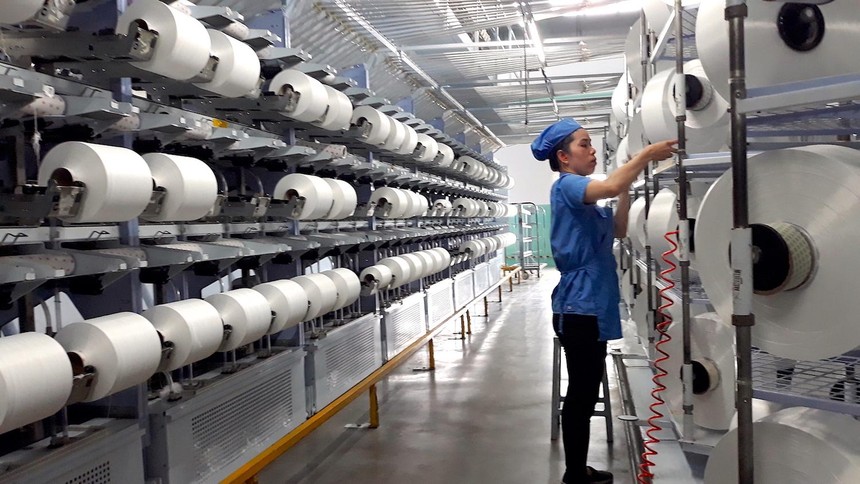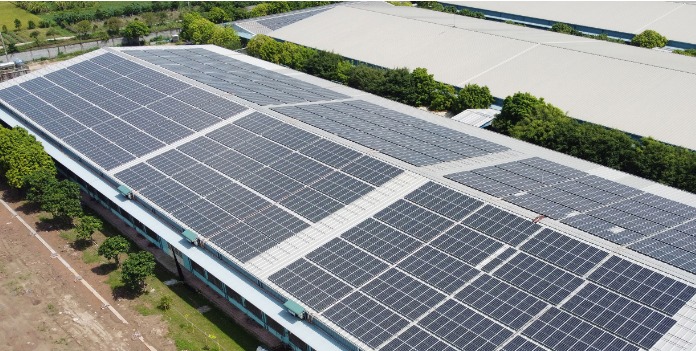Energy efficiency and sustainable development in textile sector
Thứ năm, 18/09/2025 - 15:39
Technological innovation and technical improvements are among the key solutions helping textile enterprises use energy efficiently, increase labor productivity, and strengthen competitiveness.
High Energy Consumption
According to the Vietnam Textile and Apparel Association (VITAS) and the United States Agency for International Development (USAID), the textile industry spends about USD 3 billion annually on energy consumption. Statistics show that textiles account for around 8% of total industrial energy demand and emit about 5 million tons of CO₂ per year.
In Vietnam, textiles are one of the key industries, contributing about 12% of the industrial GDP and 5% of the national GDP. However, alongside rapid growth comes very high energy consumption. Currently, energy accounts for about 8–10% of total production costs in the sector and can rise to 20–25% in energy-intensive processes such as dyeing and washing. In fact, the average electricity consumption of a textile-dyeing plant ranges from 0.2–0.4 kWh/kg of fabric, along with 80–100 kg of steam per ton of fabric.
| According to the Ministry of Industry and Trade, the textile industry still has an energy-saving potential of up to 20%. Therefore, technological renewal and technical improvements are essential solutions to help enterprises in the textile sector use energy efficiently, improve productivity, and increase competitiveness. |
Results from Energy Efficiency
To reduce production costs and enhance competitiveness, many enterprises have actively adopted energy-efficient technologies. Mr. Nguyen Van Hai, Head of Utilities at Soi The Ky Synthetic Fiber Corporation, shared that the company has implemented a series of measures, including replacing outdated, energy-intensive equipment with modern alternatives and designing workshops to maximize natural light, thereby reducing unnecessary electricity use.
In addition, Soi The Ky installed inverters for machinery and improved the compressed air system, helping the company save 2,643,058 kWh of electricity and cut about 12,768 tons of CO₂ emissions between 2018 and 2023.
Particularly since 2020, Soi The Ky has installed rooftop solar systems at its Cu Chi and Trang Bang plants, with a total capacity of 7.4 MWp/year. By 2023, solar power accounted for more than 6% of the company’s total energy consumption.

Soi The Ky applies modern technology in production.
For Son Ha Co., Ltd. – Hung Yen Branch (formerly Thai Binh), cutting production costs and improving competitiveness through investment in energy-efficient equipment and technology has been a sound choice.
According to Mr. Le Ngoc Luc, Head of Mechanical and Electrical Department, the company carried out an energy audit to identify measures for efficient energy use. Accordingly, all incandescent and fluorescent lamps were replaced with LED lights; high-power-consuming machines were equipped with inverters to protect motors, reduce mechanical wear, improve productivity, meet technological requirements, and save electricity. Traditional electromechanical sewing machines that consumed large amounts of power were replaced with inverter-based electronic sewing machines, which save maximum energy. Notably, the company invested over VND 12 billion in a solar power system with a total capacity of 998 kWh, meeting 41% of the entire factory’s electricity demand.

Son Ha Co., Ltd. invested over VND 12 billion in a solar power system for production.
“The implementation of energy efficiency and green energy measures has helped the company cut energy costs from VND 450–500 million per month to only VND 150–200 million per month. Energy-saving practices not only reduce costs but also improve product quality, extend machinery lifespan, and ensure uninterrupted operations, thereby meeting delivery schedules for customers. More importantly, the company fully meets standards on factories, green energy use, environmental protection, safety, and worker welfare, creating favorable conditions for negotiating production orders and maintaining exports to partners in France, the U.S., Canada, Japan, and South Korea,” Mr. Le Ngoc Luc shared.
Honoring Enterprises Leading in Energy Efficiency
Energy efficiency is one of the key measures for enterprises to keep production costs low and remain competitive in the global market. Effective management and energy efficiency solutions across production and business lines have brought significant benefits, reducing greenhouse gas emissions, protecting the environment, and demonstrating corporate social responsibility, while also contributing to national energy security.
Within the framework of the Vietnam National Energy Efficiency Programme for the period 2019–2030 (VNEEP3), the Ministry of Industry and Trade is planning to organize the “2025 Energy Efficiency Awards in Industry.”
The award aims to recognize and honor outstanding models and solutions for energy efficiency in industrial production, thereby creating a positive social impact and contributing to the goals of economic–social development, environmental protection, and sustainable growth during the country’s industrialization process.
Duc Do
